Afghanistan War, CIA Sponsored Terror, Civil Liberties, Criminalizing Dissent, Habeas Corpus, Human Rights, Iraq War, NSA Spying, Political Prisoner, Prison Industry, Surveillance, Targeting Muslims, Torture, Truth to Power, War Resister
Podcast: Play in new window | Download
Updates
- Michael Ratner Reports On An Important Break In The Julian Assange Case
- Michael Ratner: Longest Case Of Pre-Trial Investigation In Swedish History In Which The Prosecutor Has Simply Sat On Her Hands.
- Michael Ratner: What Sweden Did Here Is Divert Attention From The Underlying Problem
- Michael Smith: United Nations And The Cuban Embargo Vote 2014
- Michael Ratner: Israeli Business Men Are All Over Cuba
——-

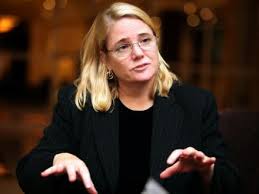
Blackwater Guards Found Guilty in 2007 Baghdad Killings
Since 2003, private military contractors have been awarded millions of dollars each year by the U.S. Government in contracts. Many of the military contractor personnel have engaged in atrocious war crimes with zero accountability. Last week a federal jury convicted 4 former Blackwater private security contractors on manslaughter charges and 1 for manslaughter and murder of 17 Iraqis in Baghdad on September 16, 2007. The men were prosecuted under the Military Extraterritorial Jurisdiction Act, a law that allows the U.S. courts to hear cases against contractors to the U.S. Department of Defense for crimes committed overseas. The men were originally hired as private security guards for U.S government employees. Lawyers for Blackwater, now known as Academi LLC argued that the men were simply returning fire to protect themselves.Several civil cases filed by victims injured in the shootings were settled in 2010.
Attorney Susan Burke:
- I think the verdict sends a very loud and large message to the globe that the American judicial system can operate properly.
- That American juries understand when they see war crimes, they understand when they hear about a massacre.
- We began working before the Abu-Ghraib photos were leaked. It began when Bob Woodward wrote a story for the Washington Post that revealed that the Bush Administration had decided to use torture as an instrument in the war.
- We viewed this outsourcing as a potential weak flank in a sense in order to use legal mechanisms, lawsuits in order to prevent this country from departing with its values.
- We were putting the evidence together before the photos leaked and suddenly we had a lot more evidence to sue the 2 government contractors L3 and CACI that were involved in the Abu-Ghraib torture.
- The Blackwater case fits into that rubrick where we brought several different law suits along with the Center for Constitutional Rights. We brought the seven law suits for the victims of the Nisour Square massacre as well as for many other victims.
- If you think about we’re going to the home turf of the wrong doers. The corporations are based in Virginia actually, and so we sued them in their home turf.
- There’s one (civil) case remaining that’s now being handled by Baher Azmy at CCR and they just got a win from the Fourth Circuit – again getting permission for the case to proceed.
- The vast majority of victims have settled with L3 paying 5.25 million.
- Blackwater is a mercenary company that basically earned over a billion dollars from the State Department.
- They were not at Abu Ghraib rather they were providing security for all of the diplomats and other Americans in Iraq.
- At the time they were owned by Erik Prince, operated without any oversight from the State Department and they were involved with a significant number of instances were unnecessary and excessive force was used.
- Erik Prince ended up entering into a settlement and all of those folks obtained compensation.
- Prince then sold the company, retained a revenue stream but the company became Academi.
- As a nation we continue to use these mercenaries and we continue to lack any regulation or oversight. Unfortunately, things didn’t change under the Obama Administration and under Secretary Clinton at the State Department
- What’s happened is there’s this terrible pattern where these companies have a lot of political influence and they continue to get enormous contracts and the State Department continues to outsource security without have a vibrant, or robust oversight function.
- Blackwater vehicles rolled into Nisour Square and they began to open fire with heavy automatic weaponry and they simply began to spray indiscriminatly. They began to shoot all over Nisour Square killing people nearby and injuring people as they fled. No provocation, no real reason they began shooting.
- One of the Blackwater men, a man named Jeremy Ridgeway actually stepped and told the truth early on, pled guilty and explained how this was in fact just indiscriminate shooting for no reason.
- In order to properly handle these matters I ended up creating my own firm.
Guest – Attorney Susan Burke, represented plaintiffs in those civil cases and she joins us today to talk about criminal case, the sentence and the supporting evidence.
——
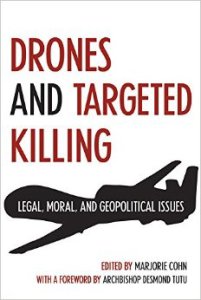

Drones and Targeted Killing: Legal, Moral and Geopolitical Issues
A powerful analysis on the use of drones for targeted assassination by the Obama Administration is explored in Professor Marjorie Cohn’s newly published book titled Drones and Targeted Killing: Legal, Moral, and Geopolitical Issues. It’s a collection of various disciplines including sociologists, legal scholars, and human rights activists that examine aspects of the U.S. policy of targeted killings with drones and other methods. The book documents civilian casualties, and discuses the first U.S. targeted killing lawsuit by the lawyer who brought the case.
Attorney Marjorie Cohn:
- Drones have become the Obama Administration’s preferred weapon of choice.
- We rarely see images of the victims of drone strikes the overwhelming majority of whom are civilians.
- We don’t hear their stories because the media sanitizes their stories.
- We really don’t have a sense of the devastation that is reeked by drones.
- I thought it was important to put together a collection of different aspects of this drone policy. Is it legal? Is it moral? What are the political ramifications? Does it make us safer? Does it make us less safe?
- That Authorization for the Use of Military Force was very limited, it was only limited to groups and countries that supported the 911 attacks and Congress specifically rejected the Bush Administrations request for open ended military authority to deter and preempt any future acts of terrorism against the United States – and yet the Obama Administration has been relying on this as its legal authority.
- Targeted extrajudicial killings off the battle field are illegal.
- Richard Falk, the U.N. Special Rapporteur to the Palestinian Occupied Territories wrote a very and interesting and provocative chapter called Why Drones Are More Dangerous Than Nuclear Weapons.
- Medea Benjamin talked about stories of victims in Pakistan and Yemen and the tolls drones take on communities. The horror, the terror that children are sleeping with drones hovering overhead.
- Pardiss Kebriaei with the Center for Constitutional Rights that handled the first targeted killing case in the United States writes a chapter.
- Tom Hayden writes the conclusion about stopping the drones.
- Phyllis Bennis from the Institute of Policy Studies talks about the assassination as essential to the U.S. war strategy due to the militarization of our foreign policy.
- John Quigley from Ohio State University talks about the blowback from drones and how they actually make us less safe because when people see their families blown up, they resent the United States even more.
- He talks about the history of U.S. foreign policy and the resentment its caused in those countries against the United States.
- He (Barack Obama) has even expanded the use of drones in Iraq and Syria. He’s also using piloted aircraft. He’s also using the AUMF which does not apply at all.
- This ISIS and Khorasan, the current groups doing horrible things over there are not covered by the Authorization for the Use Of Military Force.
- He’s actually acting beyond what Congress has authorized to say nothing of it violating the U.N. charter.
- Only 4 percent of victims in Pakistan were members or even associated with Al-Qaeda which means the overwhelming number of 2400 who have been killed in Pakistan by drone strikes are civilians.
- The FAA Modernization and Reform Act of 2012 requires the FAA to integrate into U.S. airspace by September of 2015 to legalize commercial drones and some government agencies to use small drones. This is very very worrisome because of the privacy considerations primarily.
- There are two different drone strikes the U.S. carries out. One is called personality strikes, where they target suspected bad guys. They call them militants. That could mean anything.
- No due process, just take em out.
- The other type of attack is called signature strikes. That is a strike that is carried out in an area of suspicious activity. If you’re a male between the ages of 16-65 in a area of suspicious activity than you’re fair game, even though the Obama Administration doesn’t know your identity.
- First, there must be a legal basis for using lethal force, whether it is against a senior operational leader of a terrorist organization or the forces that organization is using or intends to use to conduct terrorist attacks.
- Second, the United States will use lethal force only against a target that poses a continuing, imminent threat to U.S. persons. It is simply not the case that all terrorists pose a continuing, imminent threat to U.S. persons; if a terrorist does not pose such a threat, the United States will not use lethal force.
- Third, the following criteria must be met before lethal action may be taken:
- Near certainty that the terrorist target is present;
- Near certainty that non-combatants will not be injured or killed;
- An assessment that capture is not feasible at the time of the operation;
- An assessment that the relevant governmental authorities in the country where action is contemplated cannot or will not effectively address the threat to U.S. persons; andAn assessment that no other reasonable alternatives exist to effectively address the threat to U.S. persons.
- Finally, whenever the United States uses force in foreign territories, international legal principles, including respect for sovereignty and the law of armed conflict, impose important constraints on the ability of the United States to act unilaterally – and on the way in which the United States can use force. The United States respects national sovereignty and international law.
Guest – Attorney Marjorie Cohn former president of the National Lawyers Guild. She lectures throughout the world on international human rights and U.S. foreign policy. A news consultant for CBS News and a legal analyst for Court TV, she also provides legal and political commentary on BBC, CNN, MSNBC, Fox News, NPR, Air America and Pacifica Radio. In addition, Professor Cohn is the author of Cowboy Republic: Six Ways the Bush Gang Has Defied the Law and co-author of Cameras in the Courtroom: Television and the Pursuit of Justice and Rules of Disengagement: The Politics and Honor of Military Dissent. Her latest book, The United States and Torture: Interrogation, Incarceration and Abuse, was published in January 2011 by NYU Press.
—————————————————————–
CIA Sponsored Terror, Civil Liberties, Criminalizing Dissent, Guantanamo, Habeas Corpus, Human Rights, Military Tribunal, Surveillance, Targeting Muslims, Torture, Truth to Power, War Resister
Podcast: Play in new window | Download
Updates:
- Heidi Boghosian Updates Listeners On The Revictimization Relief Act
——
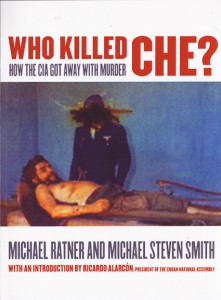

Michael Smith Returns From Argentina Book Tour
Early October marks the 47th anniversary of Ernesto Che Guevarra’s capture and assassination in Bolivia. Co-hosts Michael Ratner and Michael Smith have authored the book Who Killed Che? How The CIA Got Away With Murder. Michael Smith has recently returned from a trip to Buenos Aires to promote the Spanish language version of the book. Michael explains how Che was a threat to the United States by helping Cuba take over their own economy and why its important to set the story straight about Che’s death. Review of Who Killed Che?
—–
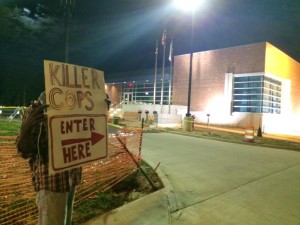
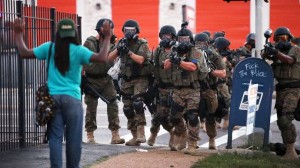
Weekend of Resistance: Ferguson, St. Louis Protests and the National Lawyers Guild
Last weekend, thousands of protesters in Ferguson, Missouri just outside of St. Louis demonstrated during a long planned Weekend of Resistance to the militarized suppression of peaceful demonstrations against the the killings of unarmed black teenagers including Michael Brown two months ago. Demonstrators traveled from cites across the country to participate in protests against police violence – including sit ins and vigil marches. Meanwhile, National Lawyers Guild members have been providing legal support, legal observation and felony representation for people arrested during the weekend. We catch up with St Louis Lawyers Guild member attorney Maggie Ellinger-Locke who has been working long hours representing arrested demonstrators. There are 90 municipalities in St. Louis and Maggie also explains the challenges in helping those arrested get processed through a unique court system.
Attorney Maggie Ellinger-Locke:
- People poured into the streets after the killing of Mike Brown and have pretty much been occupying various locations around the St. Louis area and protesting ever since.
- We at the National Lawyers Guild have mobilized close to 100 legal observers at this point to come down and do the observing and training people who are local.
- We’ve also been connecting people who are facing felony charges with representation as well as backing up the Arch City Defenders who are handling the bulk of the ordinance violations and charges.
- In August there were lots of chemical weapons used, tear gas every night. I was tear gassed multiple times. Other major mobilizations that I’ve been to, they last a couple of days, maybe the duration of a week, but this has been a continued onslaught of less than lethal weapons.
- There are a lot of difference agencies on the ground for law enforcement. There’s the Missouri Highway Patrol, St. Louis County Police Department, The Sheriff’s Department and of course we have 90 different municipalities in St. Louis County, each with its own police force.
- This is what it takes to fight back. People are out there every day on the streets.
- We’ve had NLG members pour in from all over which has really been fun getting to know all these people.
- Monsanto, which is based in Creve Coeur, Missouri, made a donation recently of a million dollars to various community groups doing work on the ground. On the other hand we’ll have a local pizza company board up and then the owner will train a gun on protesters to intimidate them.
- The demands have varied depending on the organizations. Indicting Darren Wilson, the officer who shot Michael Brown is at the top of everyone’s list. In order to achieve that you would have to have demand number 2 met which is that Don McCullough, the St. Louis County prosecuting attorney recuse himself from this case. People think that he’s conflicted in that his father was a white police officer who was shot by an African American man and killed.
- Another big demand is that the many many municipal charges that people are facing be dropped.
- In addition we desperately need reform of our municipal court system. The structure is insane.
- We’re hopeful that if we can demand jury trials for all of those arrested, we may in fact be able to crash the system.
- We have 40 people now who are facing felonies.
- The Organization For Black Struggle and Missourians Organizing for Reform and Empowerment.
Guest – Attorney Maggie Ellinger-Locke, National Lawyers Guild member and activist, and a partner with Ellinger & Assoc., P.C., a Law Firm in O’Fallon, Missouri.
——-
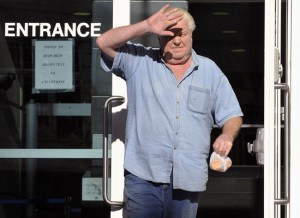
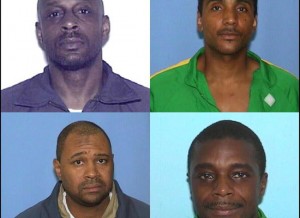
Jon Burge, Torturer of Over 100 Black Men, is Out of Prison After Less Than 4Years
Last week former Chicago police commander Jon Burge who was convicted of lying about torturing more than 100 African-American men at Chicago police stations will be released from the Butner Correctional Institution and reporting to a halfway house in Tampa, Florida. This, as many listeners know is an ongoing story that we’ve been reporting on for many years with Attorney Flint Taylor with the People’s Law Office in Chicago who worked on the case representing some of the torture victims. We talk about why Jon Burge was released and his recent article titled Jon Burge, Torturer of Over 100 Black Men, is Out of Prison After Less Than Four Years. Flint reminds listeners that the total in financial damages to taxpayers from the torture of over 100 black men that Burge oversaw, and the ongoing pension payouts to his collaborating officers, exceeds $120,000,000.
Attorney Flint Taylor:
- Burge is a now notorious police torturer here in Chicago. He shot from detective up to commander of a police station based on torturing African-Americans suspects into giving confessions and sending many of them to death row and to life in prison.
- Ultimately, we were, along with community activists, expose this pattern and practice of 100 cases of police torture.
- This was by electric shock, by bagging people and other kinds of racist brutality.
- We exposed it and nothing happened for many years. Ultimately the Feds, indicted Burge, several years ago, not for torture because the statute of limitations had run on that, but rather for perjury and obstruction of justice.
- He was convicted by a predominantly white jury and ultimately sentenced to 41/2 years in the penitentiary.
- After 31/2 years, he was permitted to go to a halfway house for 6 months.
- What’s happening now? What’s happening with regard to the men who are still in the penitentiary, decades later, and there are almost 20 of them, based on tortured confessions.
- How about the men who testified against Burge, who were his victims?
- Those men, unlike Burge who gets a pension now, and the Illinois Supreme Court has upheld his right, even as a convicted felon to collect that money. These men get nothing, have nothing.
- There are as many as 90 of those men on the streets now, with no health care, with no treatment for psychological damage.
- The majority of city council members support at this point reparations for those men. The reparations for those men would be 20 million dollars.
- The same amount of the money the city spent to defend Burge in the cases of the exonerated men.
- We’re now at a sensitive stage, where the mayor, Emanuel has had to come out. He’s no friend to the anti-torture forces, and he’s been asked repeatedly on this.
- He has played both sides against the middle, its time right now where he’s going to have to fish or cut bait.
- We had the strong support of Karen Louis who was a wonderful challenger and she has now had to withdraw from the (mayoral) race because of “health issues.” She was a strong supporter of the reparations ordinance.
Guest – Attorney G. Flint Taylor, a graduate of Brown University and Northwestern Law School, is a founding partner of the People’s Law Office in Chicago, an office which has been dedicated to litigating civil rights, police violence, government misconduct, and death penalty cases for more than 40 years.
——————————————————————————

Please help support Law and Disorder, the show is now a sponsored project of Fractured Atlas, a non-profit arts service organization. Contributions for the charitable purposes of Law and Disorder must be made payable to Fractured Atlas only and are tax-deductible to the extent permitted by law.
Afghanistan War, CIA Sponsored Terror, Civil Liberties, Criminalizing Dissent, Gaza, Guantanamo, Habeas Corpus, Human Rights, Iraq War, NSA Spying, Political Prisoner, Prison Industry, Surveillance, Targeting Muslims, Torture, Truth to Power, War Resister
Podcast: Play in new window | Download
Updates:
- Mumia Spurs Bill To Block Publicity-Seeking Criminals (Son of Sam Law)
- Guantanamo Bay Prisoner Files Historic Lawsuit Against Obama Over Force-Feeding
——

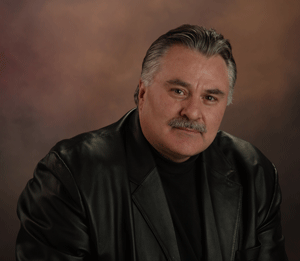
Lawyers You’ll Like – Charlie Abourezk
As part of our Lawyers You’ll Like series, we talk with attorney Charles Abourezk about his work with the Native American community in South Dakota. Charles is a trial attorney, author and film maker. His documentary A Tattoo On My Heart: The Warriors of Wounded Knee 1973 is a gripping documentation of those American Indian men and women involved in the siege. Charles is the Chief Justice of the Rosebud Sioux Tribe Supreme Court, he’s also member of South Dakota Advisory Committee to U.S. Commission on Civil Rights. He’s the son of James George Abourezk, former Democratic United States Representative and United States Senator where he was generally viewed as critical of US foreign policy in Israel and Palestinian.
Attorney Charlie Abourezk:
- The Rosebud Sioux Tribe is the second largest tribe in South Dakota. There are nine total tribal governments in the state. It’s where I grew up.
- I spent most of my adult life on the Pine Ridge Reservation which has been the poorest county in the United States.
- I went to law school, long after I worked for a number of Indian organizations including a Native American NGO that worked at the UN in Category 2 status.
- The Pine Ridge Reservation is the second largest reservation in the United States, located in south western South Dakota. It’s a huge land mass, takes about an hour and a half to drive diagonally across the reservation. There’s very little economy. The geography is very poor, it lends itself to cattle grazing but not much in terms of raising crops.
- Wounded Knee was the site of the 1890 massacre in which almost 300 American Indians from several different tribes were killed by the U.S. Army. They were surrounded and essentially murdered on that spot.
- So, in 1973, there had been a lot of racial discrimination and racially motivated killings of Indian people, the American Indian Movement returned and joined forces with the traditional people who had long been neglected on the reservation.
- As a result they decided to engage in a protest. They chose the site of the massacre at Wounded Knee, to stage that protest.
- They set up sort of a line there, with the government and US Marshalls, along with Dick Wilson’s followers who were armed and were called the goon squad and formed the other side of that line. The siege lasted 71 days.
- It finally dismantled and number of people were prosecuted as a result of that.
- At Wounded Knee, two Indian people killed and one Marshall wounded.
- We set up a recording studio right at the Wounded Knee school, and just took people’s stories. I did the interviews, they were really powerful. There were some stories that didn’t fit with the arc of the film but were incredible. I’m glad I documented it then, because I think of the people in the documentary, 7 or 8 have now passed away.
- I continue to be a strong advocate for tribal sovereignty, self determination and the rights of individuals especially within the dynamic of racial discrimination which at times in South Dakota have been as bad as the south is toward African Americans.
- I helped affirm and preserve the boundaries of the Yankton Sioux Reservation, that went up to the Supreme Court twice. I was the lead council when it finally concluded, we were able to win that one.
- I was a former Supreme Court Justice on the Pine Ridge Reservation for their Supreme Court and I retired from that position.
- Except for limited jurisdiction the Federal Government had on criminal matters, the civil jurisdiction for incidents which occur within the reservation lie with the tribal court as do criminal misdemeanors for tribal members and non tribal members meaning Indians from other tribes that happen to be living on the reservation.
- In the Native American view you can’t really have winners and losers, you have to try to restore the harmony or the balance within the tribe.
- The American government adopted the British style of colonialism as did the Israelis when they began to colonize parts of Palestine. It kind of goes in 4 steps.
- A disruption of traditional agriculture and food gathering, which out here was done in two ways, killing off the buffalo and secondly constraining them from moving around in a wide arc for hunting and gathering – by putting them on the reservation they stopped that.
- Transfer commonly owned land into private ownership, to turn land into a commodity that can be bought and sold. They did that through what’s called the Daws Act or the Allotment Act in the late 1800s.
- Theodore Roosevelt called that act a “might pulverizing machine” with which to break up the tribal mass.
- The third step was to develop a native ruling elite. In this case they first developed “paper chiefs” then in the 1930s developed modern tribal government.
- Last step, develop an educated elite. Of course any colonizer anywhere, that’s the step that always back fires.
- The American Indian Movement was born from the children of the parents who were relocated into cities trained as workers.
- They were the ones who came back home and joined forces with the traditional people and stood up against racism and in favor of tribal sovereignty and tribal self determination.
- You see many parallels with that and what’s happening to the Palestinians in the West Bank and Gaza. Dr William Julius Wilson
Guest – Charlie Abourezk, from Rapid City, South Dakota and is a trial attorney, longtime activist and community organizer in the native American community in South Dakota. He is also a documentary film maker, his most recent is the feature length documentary “A Tattoo On My Heart: The Warriors of Wounded Knee 1973” which played on public television stations around the United States. He is the current Chief Justice of the Rosebud Sioux Tribe’s Supreme Court and a member of the South Dakota Advisory Committee to the US Commission on Civil Rights. His client base is made up largely of Native Americans, tribal schools and Indian tribal governments, but he also represents plaintiffs in civil rights litigation. He will have a book coming out this next year entitled “A Mighty Pulverizing Machine: The Continuing Colonization of American Indians.”
——-
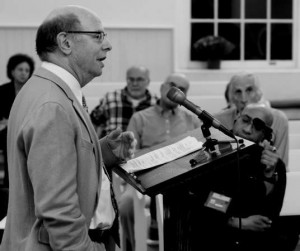
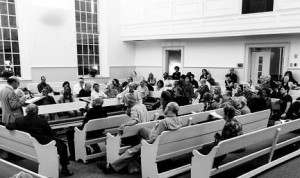
From Guantanamo to Wikileaks: Taking on the State In a Post 9/11 World.
Our own Michael Ratner, President Emeritus, Center for Constitutional Rights (CCR), past president, National Lawyers Guild; Chair, European Center for Constitutional and Human Rights delivered a talk last week titled ‘From Guantanamo to Wikileaks: Taking on the State In a Post 9/11 World.’ Michael was honored with a PathMaker to Peace Award by the Brooklyn For Peace Organization for his consistent work in litigation against government spying and surveillance of activists including the targeting of Muslims particularly after 9/11.
Law and Disorder Co-host Attorney Michael Ratner, President Emeritus of the Center for Constitutional Rights (CCR), a non-profit human rights litigation organization based in New York City and president of the European Center for Constitutional and Human Rights (ECCHR) based in Berlin. Ratner and CCR are currently the attorneys in the United States for publishers Julian Assange and Wikileaks. He was co-counsel in representing the Guantanamo Bay detainees in the United States Supreme Court, where, in June 2004, the court decided his clients have the right to test the legality of their detentions in court. Ratner is also a past president of the National Lawyers Guild and the author of numerous books and articles, including the books Who Killed Che? How the CIA Got Away With Murder, The Trial of Donald Rumsfeld: A Prosecution by Book, Against War with Iraq and Guantanamo: What the World Should Know, as well as a textbook on international human rights.
———————————————————————————-

Please help support Law and Disorder, the show is now a sponsored project of Fractured Atlas, a non-profit arts service organization. Contributions for the charitable purposes of Law and Disorder must be made payable to Fractured Atlas only and are tax-deductible to the extent permitted by law.
CIA Sponsored Terror, Civil Liberties, Criminalizing Dissent, Gaza, Guantanamo, Habeas Corpus, Human Rights, Military Tribunal, NSA Spying, Political Prisoner, Prosecution of the Bush Administration, Supreme Court, Surveillance, Targeting Muslims, Torture, War Resister
Podcast: Play in new window | Download
Updates:
- Michael Ratner: Moazzam Begg Freed After Terrorism Charges Dropped
- Michael Ratner: 149 Inmates In Guantanamo Bay Prison – 79 Approved For Transfer
——-
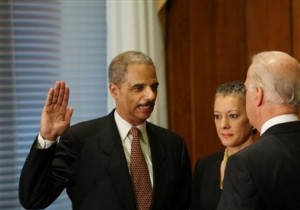

U.S. Attorney General Eric Holder Evaluation
Michael Ratner and Heidi Boghosian draw a balance sheet on the record of U.S. Attorney General Eric Holder.
- Holder approved drone killing of American citizen al-Awlaki without due process.
- Holder failed to prosecute any of the Bush Administration officials who were openly admitted torturers.
- Holder abrogated the responsibility in holding corporate criminals accountable. Wall Street.
- Holder settled with HSBC for 2 billion, the bank was caught laundering money for drug cartels yet no prosecution.
- With-Holder prosecuted whistleblowers, Chelsea Manning, Julian Assange, Edward Snowden, James Risen, Jeremy Hammond, Fox News Reporter,
Law and Disorder Co-host Attorney Heidi Boghosian, executive director of the A.J. Muste Memorial Institute, a nonprofit charitable foundation providing support to the nonviolent movement for social change. Before that she was executive director of the National Lawyers Guild. She is author of the book “Spying on Democracy: Government Surveillance, Corporate Power, and Public Resistance” (City Lights, 2013) as well as several reports on policing and the First Amendment.
Law and Disorder Co-host Attorney Michael Ratner, President Emeritus of the Center for Constitutional Rights (CCR), a non-profit human rights litigation organization based in New York City and president of the European Center for Constitutional and Human Rights (ECCHR) based in Berlin. Ratner and CCR are currently the attorneys in the United States for publishers Julian Assange and Wikileaks. He was co-counsel in representing the Guantanamo Bay detainees in the United States Supreme Court, where, in June 2004, the court decided his clients have the right to test the legality of their detentions in court. Ratner is also a past president of the National Lawyers Guild and the author of numerous books and articles, including the books Who Killed Che? How the CIA Got Away With Murder, The Trial of Donald Rumsfeld: A Prosecution by Book, Against War with Iraq and Guantanamo: What the World Should Know, as well as a textbook on international human rights.
——-
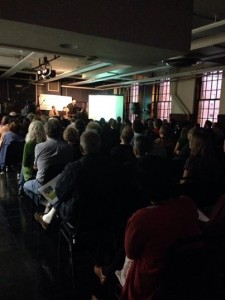

Academic Freedom & Political Dissent: A Conversation with Katherine Franke and the Community
We continue to report on Professor Steven Salaita’s case and the concerns regarding established principles of academic freedom. We hear a presentation by Katherine Franke, Professor of Law at Columbia University. Listeners may recall that Professor Salaita was unhired from the American Indian Studies program at the University of Illinois at Urbana-Champaign because of his statements on social media criticizing Israel’s conduct of military operations in Gaza. We reported last month on Law and Disorder that scholars from law schools around the country came out with a letter condemning the decision of the University of Illinois to unhire Professor Salaita. Katherine Franke discussed Salaita’s case at the University of Illinois at Urbana-Champaign late last month.
Speaker – Katherine Franke, Isidor and Seville Sulzbacher Professor of Law; Director, Center for Gender and Sexuality Law at Columbia University. She was awarded a 2011 Guggenheim Fellowship, and is among the nation’s leading scholars in the area of feminism, sexuality and race. In addition to her scholarly writing on sexual harassment, gender equality, sexual rights, and racial history, she writes regularly for a more popular audience in the Gender and Sexuality Law Blog. Franke is also on the Executive Committee for Columbia’s Institute for Research on Women and Gender, and the Center for Palestine Studies and teaches at a medium security women’s prison in Manhattan. Her legal career began as a civil rights lawyer, first specializing in HIV discrimination cases and then race and sex cases more generally. In the last 25 years she has authored briefs in cases addressing HIV discrimination, forced sterilization, same-sex sexual harassment, gender stereotyping, and transgender discrimination in the Supreme Court and other lower courts.
—————————————————————-

Please help support Law and Disorder, the show is now a sponsored project of Fractured Atlas, a non-profit arts service organization. Contributions for the charitable purposes of Law and Disorder must be made payable to Fractured Atlas only and are tax-deductible to the extent permitted by law.
CIA Sponsored Terror, Civil Liberties, Criminalizing Dissent, Human Rights, Political Prisoner, Prison Industry, Surveillance, Targeting Muslims, Truth to Power, War Resister
Podcast: Play in new window | Download
Updates:
- Professor Salaita Press Conference Update
- Michael Ratner: 13th Anniversary of 9-11
- Michael Ratner: You Can’t Have Imperialism Abroad And Democracy At Home
- Michael Ratner: Basically . . .It’s Over. The Legal System Is Done For.
- Michael Ratner: September 11, 1973 Anniversary – Chilean Coup D’état
- Michael Ratner: September 7, 1971 Anniversary Attica Prison Rebellion
—–

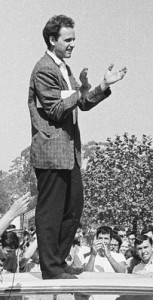
50 Year Anniversary of the Free Speech Movement
The Free Speech Movement began September 14, 1964, marking the 50 year annivesary this month. It began when the University of California at Berkeley announced that existing university regulations banning political activity on campus would be “strictly enforced.” The resulting protests, unprecedented in scope, were the harbinger of the student power, civil liberties, and antiwar demonstrations that convulsed college campuses throughout the country for the next decade. American playwright, social activist and author Barbara Garson joins us to talk about the Free Speech Movement and her most famous work MacBird.
Barbara Garson:
- I was at the University of California at Berkeley and when we got back to campus in 1964 some people from the Freedom Summer in Mississippi, myself working with the farm workers in California . . . we come on to campus and we discover that the area in front of the school that we (all the groups) traditionally used to hand out leaflets about their events and so on, suddenly you couldn’t hand out leaflets there.
- The reason we were given was trash. That is to say litter.
- Pretty soon all the groups, I mean all the groups, the Republicans, the Young Republicans, the Democrats and the Anarchists, we all went to the administration and . . . . they dropped that flimsy excuse.
- They said no, the only thing is you can’t pass out leaflets on campus that advocate action off campus.
- It was obvious not only to the radicals but all the students that some . . powerful people in Berkeley had become annoyed by the farmworkers boycott and the equal employment picket lines in Oakland and had put pressure on the president of the university.
- All the groups realized this wasn’t an issue about litter, it was an issue of free speech.
- Throughout that year of expulsions, arrests, all the groups stood together.
- They stuck together with a very simple demand, that we be able to exercise the freedoms guaranteed by the Constitution of the First and Fourteenth Amendments on the CAL campus.
- We won 100 percent.
- We created a counter force and we stayed with it. I don’t believe in the cult of a personality but Mario Savio really was special.
- The campus police called the Berkeley Police and the Berkeley Police who are very nice put Jack Weinberg in a police car. Suddenly everybody sat down around the police car. There are dozens of people who claim to be the first person to sit down around the police car.
- He (Jack) knew immediately not give his name to step up the action.
- People start getting on the police car to address the crowd. Try to remember back what kind of kids we were. When you look at the pictures we had short hair, we had bright glasses, just really nice kids. (They take off their shoes before getting on police car.)
- One of the people who gets on the police car is Mario Savio who’s been on a Freedom Summer, that summer. The gift that Mario gave us was his utter sincerity.
- He (Mario) created that sense, we’ve come here to do something worthwhile with our lives. We were talking lives, not lifestyle.
- We were very naive and we accept committees to look into the free speech regulations on campus.
- Over the course of six months it became clear to everyone that there was nothing we could do that we would be betrayed.
- Many of the students were most radicalized by being lied to.
- I’m an FSM alumni really, not a Berkeley alumni.
- It’s just natural, they really did agree with us, who doesn’t agree with the First and Fourteenth Amendments.
- We literally voted to dissolve the Free Speech Movement. That’s wrong. We saw the same thing happen with Occupy, from a good impulse, not be like them, we haven’t presented any power to fight them.
- One of the areas where we left no fight, the economic areas which have seen working people beaten down for the 40 years.
- Now when you go to the University of California Berkeley campus you don’t need regulations about speech when most of the students have mortgage sized debts.
- When I went to University of California Berkeley my tuition was free.
- The FSM, well, its in part in sorrow that we meet to figure out how things went this way.
- FSM.org – Reunion Event
Guest – Barbara Garson, an American playwright, author and social activist known for the play MacBird. She wrote a series of books describing American working lives at historical turning points, including All the Livelong Day (1975), The Electronic Sweatshop (1988) and Money Makes the World Go Around (2001). Her new book, just published, is Down the Up Escalator: How the 99% Live in the Great Recession
——-
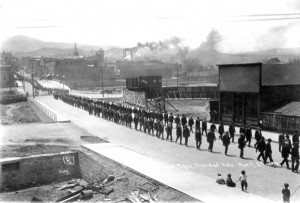
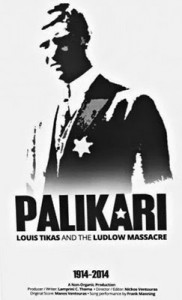
Louis Tikas and the Ludlow Massacre
Louis Tikas and the Ludlow Massacre is the title of the new documentary film from Greece by Lamprini Thoma and Nickos Ventouras. April 20, 2014 marked the 100th anniversary of the historic attack on workers. In April 1914, the Colorado National Guard and Colorado Fuel and Iron Company Camp Guards began shooting into a tent colony of 1200 striking coal miners and their families in Ludlow Colorado. 39 people were killed including 2 women and 11 children. Among the murdered was Louis Tikas, a Greek immigrant who is remembered in this documentary for his work that helped launch the U.S. labor movement. The story is told through the voices of prominent historians, artists and the descendants of Ludlow miners in Colorado.
Lamprini Thoma:
- When the situation in Greece . . . we’re not a democracy anymore, you know. When we started losing our working rights, we started having problems with immigrants . . it all became obvious we were back there.
- Me and Nickos who’s my partner in life and in crime, we did the movie together.
- We thought that we didn’t have to say anything, that history could say everything, about people like immigrants, like Greeks and how they suffered, and how they fought for their rights.
- That’s how it became relevant to us now. Not something from history but something from your life, you have to put in your life and you have to say to the other, see this is what happened.
- We musn’t let it happen again.
- Palikari, young men in their prime. Louis Tikas his name is Elias Spantidakis. He left from Crete, late 19th century, went to New York and from there Colorado where he got involved with the unions and he started organizing the Greeks and he saw how hard things were especially for the miners.
- He was a man of peace and of justice I can say.
- He was murdered brutally by the man of the Rockefellers at the time of the Ludlow massacre.
- In this work of ours we’re trying to let the people meet him and see how wonderful a man can be.
- At the time John Rockefeller Sr was passing his power on to John Rockefeller Jr. it was 1914 that the thugs of the Colorado Fuel and Iron Company of the Rockefellers attacked the miners.
- It was the second day of the Greek Easter, a very important time for Greek immigrants. Louis Tikas was the first to be killed among the union men.
- It’s a history then that shows how things were and still are in my opinion for the working class.
- Women were the ones to keep the house, to keep the children fed. To take their place (the men) when they were arrested.
- When working rights move on, all rights start to move on. They’re connected in a way.
- Most people think that Rockefeller was the winner. He killed them when the strike was brought. But he was not, history is the judge there . . . and how it survived in memory.
- They never speak about class war in the United States. They use other phrases.
- Our premiere will be in the CUNY Grad Center in Manhattan September 19, 2014 and we’re expecting to see you there.
- Nonorganicproductions.com – Coal is organic.
Guest-Lamprini Thoma has been working as journalist, radio producer and script writer for the last 30 years. She has covered wars in the Balkans, the former Soviet Union and West Africa. She has worked in print, online and broadcast media, including the BBC’s now defunct Greek service. She created the first specialized newspaper column on the Internet in Greece, something which still makes her proud. Lamprini and Nikos have been working together for the last ten years.
————————————————————————-
Afghanistan War, CIA Sponsored Terror, Civil Liberties, Criminalizing Dissent, Gaza, Human Rights, Iraq War, NSA Spying, Prison Industry, Surveillance, Targeting Muslims, Truth to Power, War Resister
Podcast: Play in new window | Download
Updates:
——–

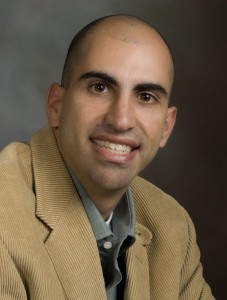
University of Illinois Chancellor Wise Going Forward With Salaita Appointment To Board of Trustees Vote
Last month, the University of Illinois rescinded the job offer of Professor Steven Salaita who wrote controversial social media posts about the war in Gaza. This raised serious concerns under established principles of academic freedom. Professor Salaita was basically dehired from the American Indian Studies program at the University of Illinois at Urbana-Champaign because of his statements on social media criticizing Israel’s conduct of military operations in Gaza. We reported weeks ago on Law and Disorder that scholars from law schools around the country came out with a very strong letter condemning the decision of the University of Illinois to dehire Professor Salaita. FOIA Email Link
Professor Katherine Franke:
- Professor Steven Salaita until recently was a tenured professor at Virgina Tech and was well known in English departments across the country and also among scholars who worked in colonialism and post colonialism studies. He developed a really rich body of work thinking about Native American rights, native people’s rights in the United States and connecting them to Palestinian rights in particular internationally.
- Read Professor Katherine Franke’s second letter here.
- He was a well sought after scholar and was hired by the University of Illinois in their American Indian Studies program in a process that started last fall.
- The department unanimously voted him an offer and this summer the university started to get pressure from outside donors, some of their alums and advocacy groups to not finalize the offer because of some tweets Professor Salaita sent out over the summer related to the Israeli attacks in Gaza.
- The emails to the chancellor were released showing that large six figure donors had seen those tweets or learned of them and said you cannot hire this guy or I will withdraw my future giving to the universities.
- So, the chancellor let Steven know that she was not going to finalize his offer even though they already negotiated his teaching schedule, he’s already rented an apartment, they had already negotiated his moving expenses.
- Right now he has no job, no income, no where to live.
- It’s the most recent iteration of what has been a rather well organized, well financed campaign in the United States in particular to purge the academy of scholars and even graduate students who are doing work that is either sympathetic to the idea of Palestinian sovereignty or rights or critical of Israeli state policy particularly the occupation.
- It was so obviously a violation of the fundamental right of academic freedom.
- I’ve only learned of his scholarship as a result of this campaign and his termination from the University of Illinois.
- I explain to Chancellor Wise in the letter that I sent, that not only will I not come to the university to speak in an official capacity but I will come to Urbana-Champaign and meet off campus with faculty and students, and members of the communities about these issues of academic freedom.
- Their strategy has been to portray any criticism of Israeli state policy or any criticism of political Zionism as uncivil or as a form of hate speech, but more importantly to appeal to a civility norm. That its not nice. That it creates an unwelcome learning environment for students, particularly jewish students.
- To see her parroting that language (Chancellor Wise) and for Chris Kennedy to parrot that language says to me that they’ve been reached by these organized operatives from the outside about how to message this termination.
- I don’t believe there is a civility norm at stake here and I think we actually shouldn’t have one in a university setting. We ought to take on uncivil ideas, ideas that are troubling, that are uncomfortable and unpack them in thoughtful scholarly ways.
- As these emails are coming out under the Freedom of Information Act Requests over the last few days its quite clear that civility is not what underwrote the decision to terminate him. It was really outside pressure from donors.
Guest – Katherine Franke, Isidor and Seville Sulzbacher Professor of Law; Director, Center for Gender and Sexuality Law at Columbia University. She was awarded a 2011 Guggenheim Fellowship, and is among the nation’s leading scholars in the area of feminism, sexuality and race. In addition to her scholarly writing on sexual harassment, gender equality, sexual rights, and racial history, she writes regularly for a more popular audience in the Gender and Sexuality Law Blog. Franke is also on the Executive Committee for Columbia’s Institute for Research on Women and Gender, and the Center for Palestine Studies and teaches at a medium security women’s prison in Manhattan. Her legal career began as a civil rights lawyer, first specializing in HIV discrimination cases and then race and sex cases more generally. In the last 25 years she has authored briefs in cases addressing HIV discrimination, forced sterilization, same-sex sexual harassment, gender stereotyping, and transgender discrimination in the Supreme Court and other lower courts.
———-
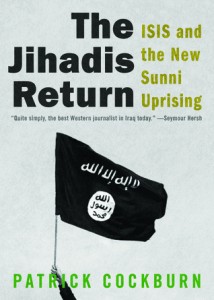
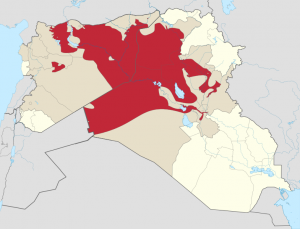
The Jihadis Return: ISIS and the New Sunni Uprising
In June of this year, the United States sent more troops to Iraq and carried out airstrikes to stop the advance of the Islamic State of Iraq and the Levant, known as ISIS into the Kurdish capitol Erbil. However, a more complicated situation has developed in Syria. The U.S., Western European, Saudi, and Arab Gulf policy is to overthrow Syrian President Bashar al-Assad, which is also the goal of ISIS and other jihadis in Syria. ISIS’s membership is between 10 and 17 thousand. We talk today with veteran Middle East correspondent Patrick Cockburn about his new book The Jihadis Return: ISIS and the New Sunni Uprising, about the origins of ISIS. We’ll also talk about the role of Saudi Arabia in the larger picture and in funding part of the Sunni terrorist groups, which was exposed by Wikileaks.
Patrick Cockburn:
- The Islamic State of Iraq and the Levant, which has turned into the new caliphate in western-northern Iraq and western Syria. It has come out of Al-Qaeda in Iraq.
- This organization that was linked to Al-Qaeda but not formed by Al-Qaeda after the invasion of Iraq in 2003 is very anti-Shia, Sunni fundamentalist is extremely violent.
- What makes it so effective is its a mixture of religious fanaticism and military efficiency.
- Some of the senior people of ISIS are former security officers and special republican guard officers from Saddam Hussein’s time.
- ISIS is led by a core of people who fought the U.S. in Iraq, fought the Iraqi Army, this is after 2003 and then after 2011 fought in Syria.
- So, it’s quite an experienced group.
- It had been growing stronger in Iraq over the last 3 years. It launched a series of campaigns, one of which to break its members out of prison.
- It had taken over quite big territory in Iraq then it had moved into Syria.
- It’s present in both countries, but its main effort was in Iraq this year.
- It always had strength in Mosul City, even though the Iraqi Army was in theoretically in charge but it would still levy protection money on people.
- Maybe 8 million dollars a month. I know contract men there paying half a million dollars a month.
- It’s final take over was swift and devastating. I can’t think of an example in history when 350 thousand men in the Iraqi Army, 650 thousand police simply disintegrated under an attack from under 3000 ISIS fighters.
- What really changed in 2011 when you had the uprising in Syria, primarily the Sunni Arabs of Syria, Iraq politicians said it would spill over into Iraq.
- The U.S. and its allies to a substantial degree were responsible for this. They backed the uprising against Assad. Even when it was apparent in the last 2 years that Assad wasn’t going to go.
- Wahhabism is the Islamic variant practiced in Saudi Arabia.
- There’s always been an alliance over the last 300 years between the preachers of this very puritanical, fanatical, violent and bigoted variant of Islam and the House of Saud.
- What they believe is not that much different from what ISIS believes. It’s very anti-Shia, the Shia seen as heretics worthy of death. It’s anti-Christian, anti-Jewish and deeply intolerant.
- Without the policies of Saudi Arabia and Pakistan, there wouldn’t have been a 911.
- Bin Laden was part of the a Saudi elite.
- Rather amazingly, the Saudis were let off scott-free.
- Kuwait has been a major financial supporter of the Jihadis, so has UAE, so has Qatar, the gulf monarchies as a whole if you like and so has Turkey.
- The problem with Obama and the U.S. is they have to decide what side they’re on. In Iraq, they’re supporting the government against ISIS, they’re supporting the Kurds against ISIS.
- But in Syria, the main opponent of ISIS is the Assad government but the U.S. policy is to weaken and displace that government.
- In a way, (the U.S. policy actually assists ISIS)
Guest – Patrick Cockburn is currently Middle East correspondent for The Independent and worked previously for the Financial Times. He has written three books on Iraq’s recent history as well as a memoir, The Broken Boy and, with his son, a book on schizophrenia, Henry’s Demons, which was shortlisted for a Costa Award. He won the Martha Gellhorn Prize in 2005, the James Cameron Prize in 2006, and the Orwell Prize for Journalism in 2009.
————————————————————

Please help support Law and Disorder, the show is now a sponsored project of Fractured Atlas, a non-profit arts service organization. Contributions for the charitable purposes of Law and Disorder must be made payable to Fractured Atlas only and are tax-deductible to the extent permitted by law.

























